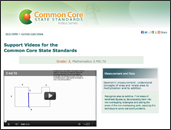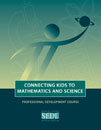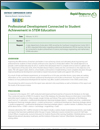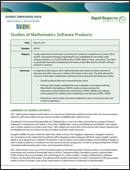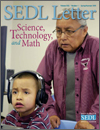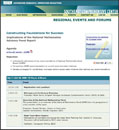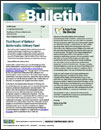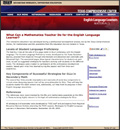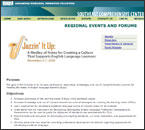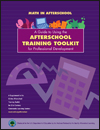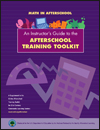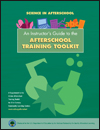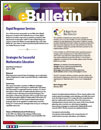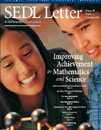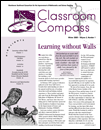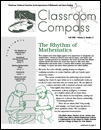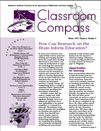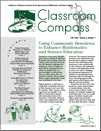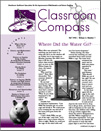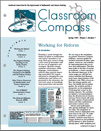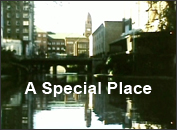SEDL's Free A-Z List of Free Resources for Mathematics and Science
Mathematics and Science
All Products in this Category
Products are listed by date published.
Mathematics instruction in the United States has historically focused on procedures, facts, and algorithms. Because of that focus, mathematics instruction, in essence, becomes lessons in arithmetic and efficiency. While there are promising changes occurring in mathematics instruction, we still need to help both teachers and students develop a more conceptual understanding of mathematics. This issue of SEDL Insights helps educators shift from helping students memorize rules to facilitating a deeper understanding of mathematics concepts.
The Common Core State Standards (CCSS) videos are designed to support states, schools, and teachers in the implementation of selected math standards. Each video is an audiovisual resource that focuses on one specific standard through examples and illustrations geared to enhancing understanding.
This nine-session professional development course provides teachers in grades 4–8 with hands-on experience in integrating mathematics, science, and technology in the classroom. The course is designed for use by an experienced trainer or facilitator and is available online free of charge.
Science, technology, engineering, and mathematics (STEM) are viewed as fundamental elements in preparing our next generation to compete in the 21st century economy. This brief examines how various states are seeking to improve access to STEM education opportunities for diverse learners to meet state and federal education priorities and funding requirements.
This K–5 supplemental instructional program provides lessons and resources that integrate math, science, and technology while supporting English learners and academic language skills. The program is available online free of charge.
The Southeast Comprehensive Center at SEDL produced this resource in response to a request by a state department of education for information about professional development for teachers on student achievement in science, technology, engineering, and mathematics (STEM) education.
This brief examines the critical need to implement instruction at the secondary level around adolescent, or content-area, literacy. The challenge is to connect the teaching of literacy to the rest of the secondary education improvement agenda.
This resource was developed in response to a request for information regarding the use of the My Math Lab project and similar math software programs (i.e., Plato, Aleks, Math in Focus, and others), and information on the effectiveness of math software programs in practice. In response to this request, staff conducted web-based and hand searches of literature and other resources to obtain information on the topic. The staff selected for inclusion in this report mathematics software products based on the following criteria: Specific products that were requested by the client, products with studies available that were evaluated in accordance with the What Works Clearinghouse (WWC) evidence review protocol for elementary school mathematics interventions (WWC, 2009d) and evidence review protocol for middle school mathematics interventions (WWC, 2009e), and products for which studies have been published in peer-reviewed journals and in other publications.
In this issue of SEDL Letter, we address challenges and solutions related to science, technology, engineering, and Math (STEM) instruction. We describe three different professional development projects, where SEDL content experts are helping teachers provide instruction in math, science, and technology—or some combination of the three—more effectively and in a more integrated way. We examine the importance of evaluation in helping educators identify and meet goals on STEM-related projects. We also review a research report on ways that instructors can engage students, especially those who are underrepresented in STEM fields.
The Trouble With Math Is English was presented by Como Molina at the Conference for the Advancement of Mathematics Teaching, San Antonio, TX, in July 2010.
The presentation slides for The trouble with Math is English are available online in PDF format. Click here for a text transcript of the slides.
The objectives of this forum included understanding implications of key recommendations of National Mathematics Panel Report (NMPR), connecting key NMPR recommendations to current work and state initiatives, and developing strategies for coordinated, leveraged actions across state initiatives that address key recommendations.
Student effort matters! This is just one of the findings of the National Mathematics Advisory Panel in its 2008 report titled Foundations for Success—The Final Report of the National Mathematics Advisory Panel. This 120-page report addresses one central question: How can schools in the United States improve mathematics curriculum, instruction, assessment, teacher training and support so that all American students learn mathematics so that they can compete with students from other nations? In the report, the advisory panel discusses 45 findings and recommendations on key topics, such as instructional practices, materials, professional development, and assessments. The authors stress the importance of knowledgeable teachers, effective instruction, effective assessment, and the need for rigorous research in mathematics education.
Based on a 2006 professional development session for math and ESL specialists, this online interactive document includes teaching strategies for ELLs at various levels, critical components to include when designing math lessons for ELLs, and a list of relevant resources.
Creating a culture that supports English Language Learners (ELLs) through the use of research-based instructional strategies and targeted approaches was the focus of a regional institute held by the Southeast Comprehensive Center (SECC). The institute took place November 5–7, 2008, in New Orleans, Louisiana. The goal of this institute was to increase participants’ awareness, knowledge, and use of research-based practices for meeting the needs of ELLs.
The Afterschool Training Toolkit materials are designed to illustrate techniques and activities that leverage student curiosity to make mathematics in afterschool both enjoyable and relevant. This guide provides professional development ideas for each of the seven promising practices in afterschool math enrichment.
The seven promising practices in afterschool math identified in the Afterschool Training Toolkit are as follows: Finding Math; Math Centers; Math Games; Math Projects; Math Tools; Math Tutoring; Family Connections. When used with the Afterschool Training Toolkit, the lessons in this instructor’s guide will help you master these promising practices. Once you become proficient at these practices, you should be able to use them to develop other math lessons.
The five promising practices in afterschool for science identified in the Afterschool Training Toolkit are as follows: Investigating Science Through Inquiry; Exploring Science Through Projects and Problems; Integrating Science Across the Curriculum; Engaging Families and Communities in Science; Tutoring to Enhance Science Skills. When used with the Afterschool Training Toolkit, the lessons in this instructor’s guide will help you master these promising practices. Once you become proficient at these practices, you should be able to use them to develop other science lessons.
This issue of SEDL Letter examines issues related to improving math and science achievement, including the importance of providing a foundation in algebraic thinking well before high school.
This newsletter issue demonstrates some of the factors all good field trips share and what teachers, principals, and students can do to make sure a field experience enhances classroom learning.
This issue of Classroom Compass focuses on the Alvord School in Santa Fe, New Mexico, where instructors are using dance and music to make math more engaging for students.
This newsletter for teachers highlights some relevant theories and findings from cognitive research and links them to classroom applications.
This study compares and contrasts the development and implementation frameworks in 16 states, Puerto Rico, and the U.S. Virgin Islands.
This newsletter for teachers features Using Community Resources to Enhance Mathematics and Science Education, an introduction to SCIMAST's Directory of Science-Rich Resources.
This newsletter for teachers concentrates on discovering new science understanding which focuses on science and mathematics for all.
This newsletter's main article, Working for Reform, looks at the idea of teacher as facilitator - a basic part of the reformed classroom.
A Special Place traces the history of the interaction between the natural and the man-made elements in the San Antonio River setting. The production explores the story of the river in the life of the city and the lives of its citizens. A priceless environmental asset, this spring-fed stream comes to life in the northern part of the city, winds its way through downtown, proceeds south by the old Spanish missions, then leaves the city to continue its journey to the Gulf of Mexico. The story of the river is intertwined with that of the city whose name it shares. By examining this history and functioning of this river and the city built around it, it is possible to gain insights into some of the issues that confront American cities today.


